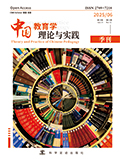

1919年, 中国在巴黎和会上谈判失败, 一种激烈的民族意识迅速扩展到了整个知识群体, 留美生通过“抵制日货”这一“激情革命”的方式, 表达对这一事态的密切关注。就留学生对“抵制日货”的态度来看, 大部分留学生萌发了民族意识的情绪, 而以少数留学生为代表则对以上问题更倾向于采取一种趋于“民族自决”、更具有民族内在觉醒意识的自强方式。体现了书生报国的另一种面相。
After the failure of China's negotiations at the Paris Peace Conference in 1919, a fierce national consciousness quickly spread to the entire intellectual community, especially among Chinese students in the United States, who remained intensely national even though they were on the other side of the ocean. Under the stimulation of domestic and foreign difficulties, the call for national salvation is increasingly rising, and the connection between“scholar” and“national salvation” has become close, and many students consciously take the mission of national salvation to themselves. Students in the United States expressed their close attention to this situation through the“passionate revolution” of“boycotting Japanese goods”. For the students studying in the United States, although they live on the other side of the ocean, the number is not large compared with the vigorous protests in China, but they inevitably participate in the tide of national salvation and become one of the important forces for national salvation. In terms of the attitude of foreign students to“boycott Japanese goods”, most of them have a deep-rooted national consciousness in China since ancient times, while a minority of them, as representatives, are more inclined to adopt a way of self-improvement that tends to“national self-determination” and has more internal awareness of the nation. Reflects the scholar to serve the country another face. It can be said that the value choices and a series of historical activities of students studying in the United States driven by patriotic spirit reflect the dual interaction between students studying in the United States and the fate of the country in modern times, and shine the light of pure patriotic ideals of overseas students on the other side.